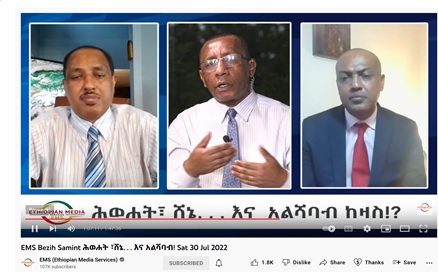
BY DEJEN RAS
On the 30th of July, Sisay Agena of Ethiopian Media Service (EMS) hosted two political analysts at his TV show, Abebe Gelaw and Dr. Derese Getachew, to discuss the different armed elements that have been operating under the guise of “liberation fronts” while in fact, these groups are actively toiling to destabilize Ethiopia. In their show, the discussants briefly raised issues related to the TPLF, OLA as well as the two-some attempt of unholy marriage to Al-Shabaab.
They also commented on the current policy of the US and the EU on the Horn, especially on Ethiopia, as Samanta Power avoided Ethiopia from her itineraries while paying visit to the Horn of Africa. The pundits express their doubt if the US and EU have changed their position on Ethiopia after the reform movement in Ethiopia. Inspired by their argument, this piece would try to delve into the current possible strategy of the US and EU toward Ethiopia.
Is Ethiopia the key US and EU partner in the Horn of Africa?
The pundits, composed of three political analysts mentioned above, discussed the recent development in Ethiopia, particularly focusing on those happening since the reform time and the recent activities of the TPLF, OLA, and Al-Shabaab. They also emphasized the central role that Ethiopia played in the region during the TPLF-led government pledging allegiance to the EU and US.
They expressed their concern and doubt if Ethiopia is still at the center of the Horn of Africa being a partner for the Westerners. The latter are assisting the TPLF or the OLA hoping to bring about regime change in Ethiopia. On the flip side, Ethiopia is fighting against Al-Shabaab, a designated terrorist group by the westerners themselves. In the past, Al-Shabaab has aligned itself with Al-Quida and ISIS. There is no change of heart yet from the westerners towards Al-Shabaab.
On the other hand, TPLF, OLA and AL-Shabaab seem to have forged collaboration against what they perceive as a common enemy, the central government of Ethiopia.
Other key aspects that need to be studied in this regard take us to Kenya, a country that is becoming more preferable to westerners. Also, developments in Somalia are happening without Ethiopia having a central role as before. There seems to be a genuine concern. Is Ethiopia a preferred country as before by the said entities?
The strategy of US and EU
The steps and measures being taken by the Westerners in the Horn of Africa (HoA) are reflections of the global context. Several key factors are defining the current global reality: China’s economic dominance, Russia’s influence on growth, and many other regional players are influencing relations between and among countries. Especially in Africa, the population is younger and there seems to come more of a new generation to leadership, challenging the previous kind of status quo, more specifically one that has been in place since colonial time. The recent developments in Ethiopia speak volume. The young prime minister that comes to power who seems to have been introducing unprecedented respect-based relations with the West can be an example. In this fashion, it looks like the era of boss-servant sort of relations have ended.
As China and Russia are trying to consolidate more and more gains, the US and EU on their part are following a calculative and cautious strategies in the continent, especially in their relations with HOA. The transitions surfacing here and there in the different countries are fragile. They cannot play their game as they used to do it in old times. The new generation’s awareness is not the same as that of the old times. Their steps are closely and critically watched. If they do not show respectful leadership, others are offering it instead. There are indications that the realities are understood. One can closely observe the swift changes of US’s Horn envoys after envoys. They seem to have understood the consequence of their missteps.
US’s support to the already fallen TPLF has become the subject of discussion among many in the region including scholars and journalists. TPLF’s mouthpiece Getachew Reda publicly said the US was throwing support behind them including on the conditions they would control the capital, Addis Ababa. The US’s position is potent to harm its own interest in the region.
Evidenced by a recent visit by team of envoys and ambassadors
Over the week, a team of envoys and Ambassadors from the Western nations have visited Mekele. The government has assisted them to travel there just to express the will of the government for the proposed peace talks. However, the team who traveled to Mekele displayed different approaches. The team “indulged in appeasement,” as it is expressed by the National Security Advisor of the Prime Minister Ambassador Redwan Hussien. They seem to enjoy their visit by taking selfies and sharing them on social media. Some were expressing their disgust on the way the visitors behaved. To hang out with criminals, murders, and child soldier recruiters. However, these team members are showing their calculative mindset in public. They are trying to show sympathy and support for their previous lapdogs. In doing that they send a signal that they are faithful in their friendship. They as well seem to have used this relationship as a gambling/bargaining chip in their dealing with the central government.
Beyond the forces of division and destruction
For Ethiopia, the way forward should be to see the country’s forthcoming bright future beyond the forces of division and destruction. There is an enabling international environment for the bright future to come. In the past, we had a bipolar world—the capitalist and communist world. The world today has multiple poles. Different forces are dominating regional and global affairs. It is not only Russia or the USA, or the EU, but there are influencers like China, Turkey, India, Brasil., UAE, and so on. The days of one dominating different spheres like economic, political, technological, social, and even resources are over. It is not wise to depend on one only. We should not depend on the politics of Aid. Instead, the politics of mutual trade and mutual partnership should flourish. In this regard, the current position of the leadership of Ethiopia that promotes mutual interdependence based on the principles of respect would do the tricks.
Editor’s Note: The views entertained in this article do not necessarily reflect the stance of The Ethiopian Herald
The Ethiopian Herald 6 August 2022




